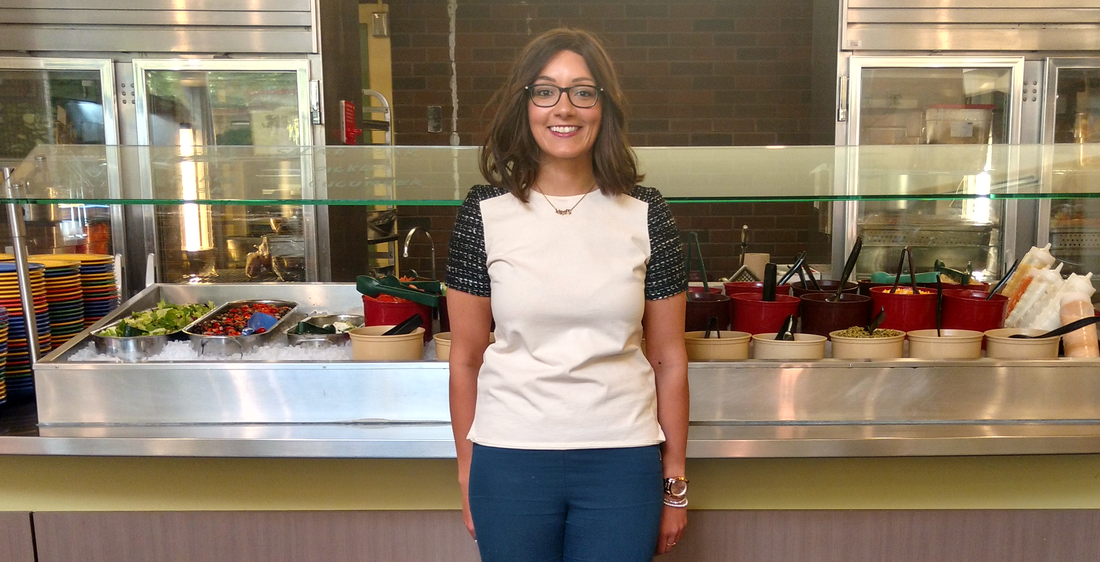|
Pooja Mansukhani is the Registered Dietitian and Food Safety Officer in Food Services at the University of Toronto. She has been working as a Registered Dietitian in university and college foodservices for 3.5 years. Pooja earned her nutrition degree from Ryerson University where she currently teaches a Food Service Management course, and also holds a degree in Honours Applied Economics, Co-op from the University of Waterloo. Pooja enjoys being active and teaches spin classes in her spare time. She sits on the board of the Ontario Home Economists Association and was formerly the Co-Chair of the Ontario Home Economists in Business. She volunteers with the Sport Nutrition Network of Dietitians of Canada and in various capacities with undergraduate and graduate Nutrition programs in Ontario. Pooja has her own private practice and is a consultant for a food startup company. She received a Member Recognition Award in the category of Innovation from Dietitians of Canada in 2016, and is currently pursuing a Diploma in Sport Nutrition through the International Olympic Committee. Pooja has a passion for local food and sustainability and biked her way through her backyard of southern Ontario for ten days in 2014, visiting and working on farms as part of Otesha’s ‘Pedal to Plate’ bike tour. She enjoys cooking but is a minimalist in the kitchen and is always on the lookout for quick, easy, and nutritious recipes- her current breakfast go-to is a mix of coconut and almond milk, protein powder, chia seeds, nuts and fruits that she prepares the night before. What’s a fun fact about yourself?
My birthday is on Christmas Eve and when I was born, the nurses cleaned me up and placed me in a Christmas stocking and handed me to my mom. What brought you to OHEA? I found out about Ontario Home Economists in Business (OHEIB) in my first year of studies at Ryerson University through a fellow PHEc., Cynthia Cousins. She suggested I join OHEIB as I was curious about careers in the field of food and nutrition. I knew I wanted to become a Registered Dietitian but I wasn’t sure which area I wanted to practice in. I began to observe that the Ryerson curriculum revolved heavily around dietetics training which was advantageous for me; however, I was also aware that only 1/3 of the students applying to an internship/master’s program were successful and the options for unsuccessful applicants were not well defined. Additionally, students who did not want to pursue dietetics altogether were not given exposure to much else. As a member of OHEIB I was learning about the depth and breadth of careers that existed in food and nutrition, and I decided I wanted to do something to help those who were undecided about their career paths and wanted to explore alternatives. I joined the OHEIB executive as the Student Liaison the following year and created the student mentorship program, and subsequently acted as the Co-Chair of OHEIB prior to its dissolution. When this occurred I knew I wanted to continue working with a home ec. organization so I joined OHEA in the Member at Large position on the Board of Directors. What is one skill that you have improved upon or developed from being a PHEc and OHEA member? Through developing the student mentorship program with OHEIB and rolling out a similar program in OHEA, I have strengthened my skills as a coordinator for sure. As Co-Chair of OHEIB and through holding a board position with OHEA I’ve learned a lot about organizational governance. Why did you decide to kick-start the OHEA mentorship program? As I mentioned earlier I felt there was a gap in the Nutrition and Food program at Ryerson and later learned that this gap existed at the other universities in Ontario offering nutrition programs. The majority of students enrolled in these programs had no idea what their job prospects were outside of dietetics. When I started exploring other options I was fascinated to learn about jobs as a food stylist, recipe tester, in nutrition analysis, food safety, etc. There were a million and one options that I may have never known about had I not sought them out. I wanted to share this with my peers at the time. Now that I’ve been a Registered Dietitian for 3.5 years I feel it’s even more important to get this information out to students. OHEA has a handful of new student members each year but the large majority of PHEcs are either retired or nearing retirement in the next decade or so. The only way that the PHEc designation will survive is if we continue to grow our membership with new professionals, and in today’s world, the skills that PHEcs offer are indispensable. Although a work in progress, in my opinion, the mentorship programs I have developed have been successful. Over the course of 2 years, 15-20 students/ new grads went trough the OHEIB mentorship program, and at OHEA right now there are 8-10 students signed up. The structure has changed and now it’s a more formalized arrangement with requirements for both parties. The challenge continues to be a shortage of mentors because people are busy (and some are retired!). PHEcs are often entrepreneurs so they have limited time available. How does being a PHEc tie into your day to day life, including work? I work as a Registered Dietitian at The University of Toronto in Food Services, and I’m also the Food Safety Officer. My role is broad, it combines counselling, foodservice activities (recipe development, nutritional analysis, product testing), and population health initiatives (cooking classes, educational events). I work as a PHEc everyday! What advice can you offer aspiring PHEcs and students? I know we hear this all the time, but I can’t think of anything more important than being willing to connect and network in order to find your fit. The field of food and nutrition is vast and there are MANY different types of jobs, though at the same time the world is small enough that you will encounter the same people repeatedly if you keep your eyes and ears open. I rely on my network a lot, in fact all of the jobs I’ve received in the last 7 years with the exception of 1 have come my way through my contacts. Networking and creating lasting relationships have opened up so many doors for me and it has been really rewarding. Many PHEcs also work for themselves so networks become even more valuable as you will inevitably have questions and need people to rely on.
8 Comments
Judy Fricker
1/16/2018 11:15:17 am
This was a very inspiring and interesting interview with Pooja. She is truly a cheerleader for our profession. And I agree that it's vital to grow our membership!
Reply
Pooja Mansukhani
3/1/2018 07:36:27 pm
I only just discoverer these comments upon being directed by a friend! They mean a lot coming from
Reply
Barb Holland
1/18/2018 11:13:18 am
Great article. Pooja's energy, enthusiasm and positive attitude is inspiring. I certainly agree with her comments about our profession. Engaging new grads is important. Keep up the good work!
Reply
Pooja Mansukhani
3/1/2018 07:40:21 pm
Thank You Barb for elevating my perception of the profession from the very beginning!
Reply
Wendy Sanford
1/18/2018 12:32:59 pm
Thank you Pooja for what you are doing for our profession.
Reply
Pooja Mansukhani
3/1/2018 07:42:33 pm
Thanks Wendy! There are many PHEcs who do much more than me to boost this valuable profession! I am grateful to all of them!
Reply
Mary Carver
2/8/2018 09:26:19 am
So happy to have you aboard the OHEA ship Pooja. You are everything one looks for in a PHEc. Bravo!
Reply
Pooja Mansukhani
3/1/2018 07:49:17 pm
Thanks Mary! I get it from being surrounded by wonderful colleagues like you who are full of knowledge, passion, and dedication to our values!
Reply
Your comment will be posted after it is approved.
Leave a Reply. |
The Ontario Home Economics Association, a self-regulating body of professional Home Economists, promotes high professional standards among its members so that they may assist families and individuals to achieve and maintain a desirable quality of life. Categories
All
Archives
April 2024
|
|
Subscribe to our mailing list
|
|
Unsubscribe from our mailing list
|
Copyright © 2023 Ontario Home Economics Association (OHEA). All Rights Reserved.



 RSS Feed
RSS Feed